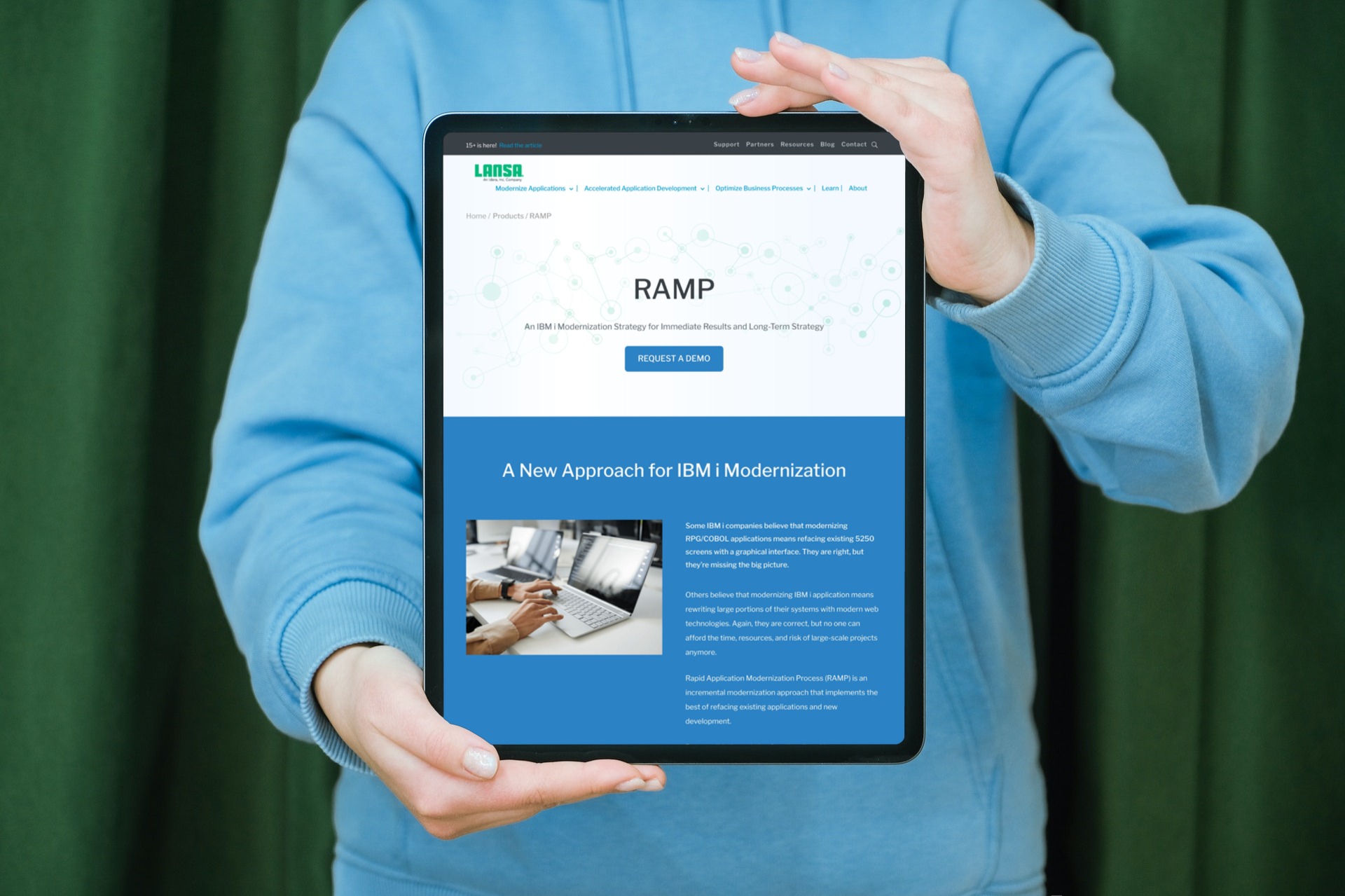In the year 2022, the use of modern mobile technologies plays important role in every field of life. Now, businesses looking for IBM i application integration solutions need to meet the current industry requirements. IBM i application integration with modern mobile technology can be a hybrid solution for application modernization. This approach enables businesses to securely connect IBM i applications to the cloud and on-premises applications, build microservices, create, expose, manage APIs, and build Microservices using modern mobile connectivity.
The IBM i platform can integrate both newer, modern technologies as well as support legacy applications. Its ability to do this opens the door for businesses who are considering integrating many of the mobile technologies that are so important in today’s manufacturing workplace. However, with this approach, businesses can integrate modern mobile technologies into the legacy IBM IT infrastructure to support the digital transformation. Furthermore, you can also take the benefits of existing investments by continuing to offer reliable, scalable, and secure application modernization.
In this article, we’ll discuss the role of mobile technology in the IBM i application modernization, why they’re important, and how to use the mobile technologies in IBM i application integration.
What is the role of mobile technology in the modern business era?
Advancements in mobile technologies have greatly enhanced many business sectors. The widespread use of mobile technology seems to have a significant impact on business communication, changing the way they interact with clients, partners, and other stakeholders. Here, we have mentioned a few aspects of how mobile technology is changing business.
Improved customer experience
Businesses are continuously seeking innovative methods to enhance the customer experience as the use of mobile devices increases. Businesses can now contact clients anywhere using several mobile apps. Mobile technology has greatly raised the bar for customer service.
Modern mobile communication technologies enable businesses to respond immediately to client questions and demands. Such interactive approaches assist in maintaining the lines of communication open. Better interactions make users more engaged, which is why developers of mobile apps are building web interfaces based on user behavior predictions.
Optimized business operations
Business processes for production and distribution have become quicker and more effective thanks to mobile technologies. Moreover, with the use of mobile technology, sharing files, sending and receiving invoices, and tracking expenses are made easier. The mobile trend has improved and streamlined business operations, accelerating workflows and boosting precision and quality.
Use of Project Management Tools
Today, project management systems work in every business environment that manages all business operations. Thanks to project management tools, workers no longer need to be in the same office to discuss ideas. Whether working at a corporate office or from home, you and your team may use a single tool to make checklists, assign tasks, set goals, and track progress. Project management software can help businesses become more efficient and save time and resources.
Improved marketing strategies
The widespread use of mobile devices has encouraged businesses to create more efficient marketing plans by integrating legacy IBM i applications. Many of them have included the usage of beacons in their everyday activities to ensure that customers can access personalized information about products and offers on their mobile devices. These well-planned marketing strategies allow businesses to monitor their customer experiences and create marketing strategies that boost leads and sales.
Improved collaboration within the workplace
Businesses can now hire employees from across the world thanks to mobile technologies. Using mobile devices such as smartphones, employers can collaborate around the globe. In this way, mobile technologies remove communication barriers.
Smart mobile devices have made it possible to conduct teleconferences, online meetings, and video conversations so employees from various regions can participate in the discussion as if they were physically present. Team members can now communicate with one another from anywhere in the world just as if they were in the office. This capability of mobile devices ensures better collaboration between employees and also improves their productivity.

Why do we need to integrate IBM i legacy systems with mobile technology?
As we’ve discussed above the widespread use of mobile devices and tablets has changed the ways businesses interact with their customers and provide information to employees.
Businesses can increase employees’ productivity by providing access to mobile devices or enabling employees to bring their own devices to work. Furthermore, people carry their mobile devices with them everywhere they go and are at ease using them to access email, social media, music, and messaging. Employees can access company information or check their email while waiting in a waiting area, such as an airport lounge.
Learn more about the benefits of deploying modernized applications in this article related to: “Where would I be without IBM?”
What are the benefits of integrating the mobile technology with IBM i applications?
When you integrate mobile technologies with IBM i applications, it does not mean you are deciding between old and new. The fact is that IBM i application integration can bring modern mobile functionalities to the existing IBM i applications without undergoing a significant technological overhaul. Here are a few mobile technology benefits for IBM i application integration:
- Businesses can improve the graphical interface by modernizing text-based green screens. The more complex and graphical reporting can be viewed on a mobile device by integrating the mobile features into the legacy IBM i applications. In this approach, the data is presented in a more attractive graphical format that is easy to interpret and read.
- For employees who manage operations in a manufacturing plant or a distribution center, there is a clear requirement for the ability to access the IBM i application’s data on a more portable mobile device rather than being restricted to a physical terminal. In this way, you can improve efficiency on the floor by integrating mobile technologies into the IBM i applications.
- Your sales team and field personnel can be equipped with information that is available everywhere. They can use that data to provide better customer service in turn. This also applies to your sales teams who require access to data on their mobile devices when working outside of the plant.
To get all these benefits, you need to integrate the IBM i legacy applications with modernized mobile apps. Before developing native mobile apps, developers with experience in RPG, COBOL, or CL would need to learn new programming languages. Similarly, they must understand HTML, CSS, and JavaScript to build a mobile web or hybrid app. All these activities require a lot of time and training costs. Moreover, the developers take time to learn new languages and tools, which reduces their productivity. What is the solution?
Can LANSA help in legacy IBM i application integration with modern mobile technology?
LANSA designed the LongRange, aXes, and RAMP tools to enable the IBM i (System I iSeries, AS/400) developer community to develop IBM i apps for mobile device users with minimal resources. Applications developed with our tools are simple to integrate with existing IBM I applications and business operations. They are less expensive because engineers can start work immediately on these applications.
The LANSA mobile app development tools supports results-oriented programming. Since it enables developers to focus on business requirements rather than mobile device technology. As a result, the total cost of ownership for a mobile app is also reduced. Particularly, for businesses without any prior experience in the development of mobile business apps.
Using the LANSA tools, businesses can avail of the following benefits:
- No new skills are required.
- Short time-to-market
- Low total-cost-of-ownership
- Rapid return on investment (ROI)
If you want to integrate mobile connectivity into your IBM i application using LongRange, aXes, and RAMP, you can contact us. You can start utilizing our modernization tools for your mobile app development and application modernization needs.








